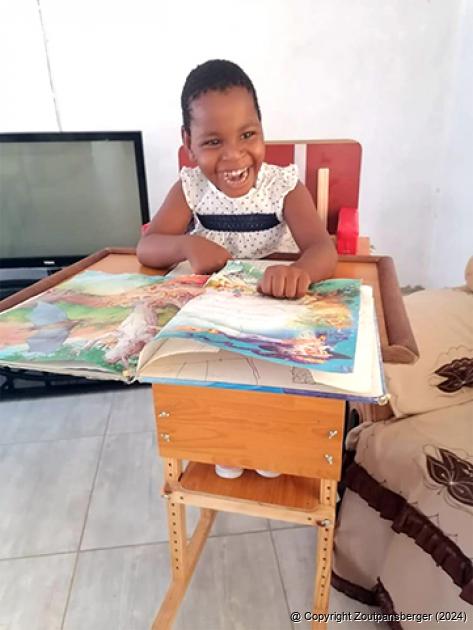

ADVERTISEMENT:

Young Dzithendo Mango from Nzhelele was the first local recipient of a standing frame purchased through money raised during the recent IsAbility Golf Day in Louis Trichardt. The smile on her face just shows how effective the therapy of being able to stand upright is. Photo supplied.
Standing frame will greatly improve Dzithendo’s quality of life
Date: 15 November 2020 By:
Many unsung heroes reside in our community, such as those involved with the IsAbility Limpopo Sports Club. They are quietly making a huge difference in the lives of local people living with disabilities.
In September, the club hosted their annual IsAbility Golf Day in Louis Trichardt with the purpose of raising money to buy standing frames as part of the Fit-to-Fly project. Following their golf day, the club was able to purchase four standing frames, and one has already been provided to a local young cerebral-palsy sufferer, 3-year-old Dzithendo Mango from Nzhelele. Her parents paid half the costs and IsAbility Limpopo Sports Club paid the other half.
According to an article compiled by physiotherapist Louisa Kirsten and occupational therapist Ilanie Lee (both from the Louis Trichardt Memorial Hospital), cerebral palsy is the most common childhood motor disorder, affecting 1 in 400 children. Many parents of children born with cerebral palsy therefore wonder what they can do to improve or enhance their child’s development and general quality of life.
Teaching these children to stand upright as young as possible is one way of improving the lives of children suffering from cerebral palsy. According to Kirsten and Lee, neurodevelopmental therapy and other services are prescribed as early as possible to optimise development of function and independence and to minimise or prevent secondary complications.
So, why are standing frames so important? Because human bodies are designed to stand upright.
According to Kirsten and Lee, cerebral palsy is associated with abnormalities of muscle tone and posture, with secondary musculoskeletal complications. These can impair mobility, posture, participation and function in daily living activities. Various postural management strategies are therefore recommended to reduce symptoms and maintain body structure, including standing frames. “However, when children have moderate to severe physical disabilities (for example, cerebral palsy, spina bifida, muscular dystrophy, developmental delay, osteogenesis imperfecta [brittle bones] or acquired injuries) which prevent them from bearing weight independently, developmental progression towards standing may not take place, or skills already gained may be lost. Independent standing or walking may not be achievable. Therefore, developing or maintaining an upright posture, using specially designed standing frames, becomes highly important,” said the two.
Louisa and Ilanie are at present in the process of selecting the next three candidates from their waiting list of patients to receive a standing frame. “The standing frames are specifically used for patients who are unable to maintain an upright position without support,” said Sandy James of the IsAbility Limpopo Sport Club. She was there when young Dzithendo completed her first activity on the standing frame. “You could see from the smile on her face how effective the therapy is. So, it is not only therapeutic for the muscular and other physiological systems, but exceptionally beneficial to their sense of well-being and achievement and their development,” said James.
With this in mind, she added that the club would also welcome donations of any of the following: hard-copy or laminated picture or story books and/or pictures suitable for children between ages 4 and 16, large-grip crayons, colouring books, building blocks, large-piece puzzles with knobs, and soft toys/plastic animals (that are not a choking hazard). “These items do not have to be new - second-hand items that are in good condition will be valued,” James said. If anyone has such items to donate, they are welcome to contact James at 084 506 3333 or e-mail her at [email protected]. James can also be contacted for more information about standing frames. Websites to find therapists in a specific area to help parents with children suffering from cerebral palsy can be found at www.otasa.org.za (SA Association of Occupational Therapists) or www.saphysio.co.za (SA Society of Physiotherapy).
Viewed: 725
|
|
Tweet |

-

Vhembe swyg oor gesloer om lekke reg te maak
18 April 2024 By Andries van Zyl -

Border fence contractors lose appeal to retain profits
18 April 2024 -

Former Triegie’s acting career taking off
12 April 2024 By Karla van Zyl -

'Temporary fix is safe, but do not touch cables,' says municipality
12 April 2024 By Andries van Zyl -

Another R2 million pumped into broken pool
12 April 2024 By Andries van Zyl


More photos...

ADVERTISEMENT


-

Park development leaves residents puzzled
22 March 2024 By Andries van Zyl -

Local para-athletes shine at SA Champs
05 April 2024 -

Epic finish for local cycling duo
29 March 2024 By Andries van Zyl -

Former Triegie’s acting career taking off
12 April 2024 By Karla van Zyl -

What next Vhembe!
22 March 2024 By Andries van Zyl

ADVERTISEMENT:


ADVERTISEMENT


